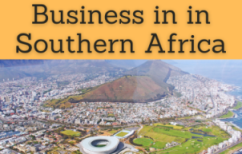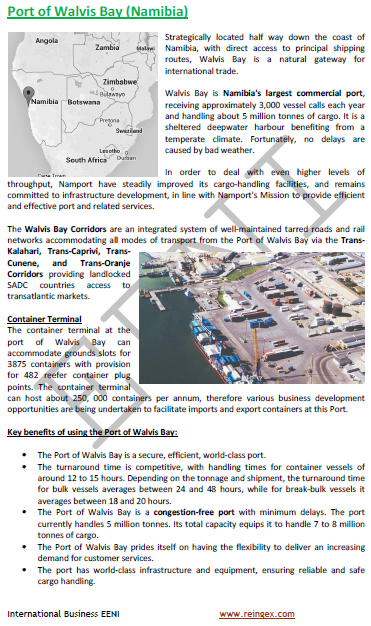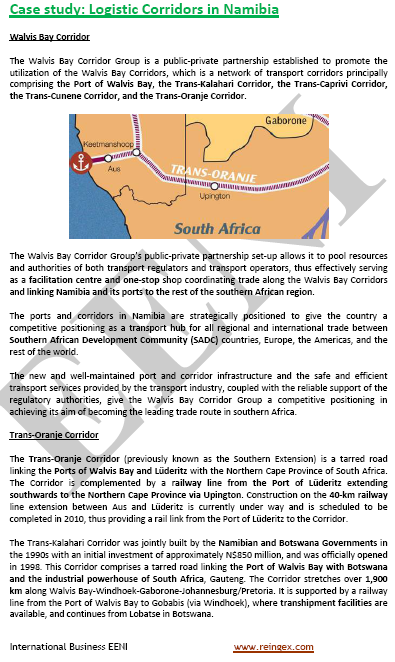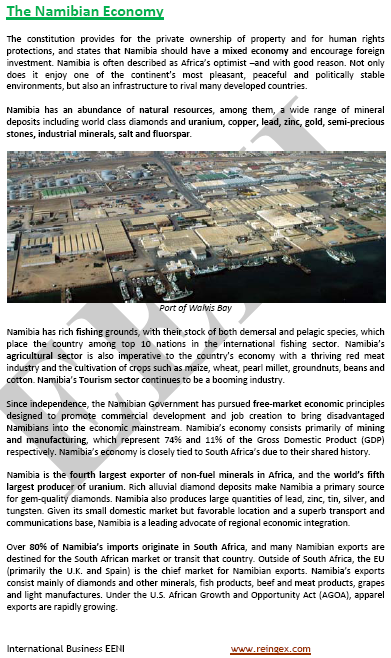Business in Namibia, Windhoek, Walvis Bay

Namibian Foreign Trade and Economy: mining and livestock. Walvis Bay Export Processing Zone
- Introduction to the Republic of Namibia (Southern Africa)
- Namibian Economy
- International Trade of Namibia
- Directorate of Customs and Excise
- Namibian Free Trade Agreements
- Implications for Namibia of the Tripartite Agreement
- Case Study:
- Walvis Bay Export Processing Zone
- Namibian Dairy Sector
- Investment opportunities in Namibia
- Cost of doing business in Namibia
- Access to the Namibian Market
- Business Plan for Namibia
The objectives of the subject “International Trade and Business in Namibia” are the following:
- To analyze the Namibian Economy and Global Trade
- To know the trade opportunities in Namibia
- To explore the Namibian trade relations with the country of the student
- To know the Namibian Trade Agreements
- To develop a business plan for the Namibian Market

The Subject “Foreign Trade and Business in Namibia” belongs to the following Online Programs taught by EENI Global Business School:
Doctorate in African Business, World Trade.
Master in Business in Africa, International Business, Foreign Trade.

Course: Business in Southern Africa.

Languages:  or
or  Namibie
Namibie  Namibia
Namibia  Namibia.
Namibia.
- Credits of the subject “Doing Business in Namibia”: 1

- Duration: one week

Masters adapted to  Namibian Students.
Namibian Students.
International Trade and Business in Namibia
Namibian economy is based on mining and livestock. A diamonds, minerals, fish, meat, and livestock exporter.

- Port of Walvis Bay
- Logistics Corridors in Namibia: Walvis Bay, Trans-Oranje, Trans-Caprivi, and Trans-Cunene
- Tripoli-Windhoek Corridor



Namibian Free Trade Agreements and Preferential Access:
- Namibia and the Southern African Economic Area
- Southern African Development Community (SADC)
- EU-SADC Agreement
- COMESA-EAC-SADC Agreement
- African Continental Free-Trade Area
- Southern African Customs Union (SACU)
- India-SACU Agreement
- EFTA-SACU Agreement
- UK-SACU and Mozambique Economic Partnership Agreement
- MERCOSUR-SACU Preferential Trade Agreement
- Namibia-Zimbabwe Agreement
- Namibia-EU
- Africa-EU Partnership
- EU-GSP
- AGOA
- Conference on the Great Lakes Region - Guest Member

- WTO
- GATS
- Agreement on Sanitary Measures
- Agreement on Technical Barriers to Trade
- Agreement on Preshipment Inspection
- Agreement on Safeguards
- Trade Facilitation Agreement
- WCO
- BIC (Containers)
- Chicago Convention (ICAO)
- International Maritime Organization
- Istanbul Convention - not a member
- Customs Convention on Containers - not a member

- Economic Commission for Africa
- African Union
- AU Convention on Combating Corruption
- AUDA-NEPAD
- African Development Bank
- Africa-Asia Partnership
- China-Africa Cooperation
- Africa-India Cooperation
- Africa-BRICS
- n
- Africa-South America Summit
- Afro-Arab Cooperation
- Arab Bank for Africa (BADEA)

- UN
- WB
- IMF
- World Custom Organization
- WTO
- Multilateral Investment Guarantee Agency (MIGA)
- Commonwealth of Nations
- African, Caribbean and Pacific Group (ACP) countries
- CPLP (observer country)
- The Republic of Namibia (Africa) shares borders with Angola, Zambia, Botswana, and South Africa
- Namibian Government: Multiparty Parliament with Democratic Constitution
- Official language of Namibia: English
- Other Namibian languages: Afrikaans, Herero, Lozi, Kwangali, Oshiwambo, and Tswana
- Capital of Namibia: Windhoek;
- Namibian Population: 2.6 million people
- Namibian Area: 825,615 km²
- Independence of Namibia from South Africa in 1990
- Currency of Namibia: Namibian Dollar (ET) and South African Rand (ZAR)
More information about Namibia (EENI African Business Portal).
Main Religions in Namibia:
- Christianity (90% of Namibian population)
- African Traditional Religions

Namibia belongs to the Southern African Economic Area.
Logistics Corridors in Namibia:


Economic Profile of Namibia:
- Free market economy
- Namibian GDP: 12.30 billion dollars
- GDP growth rate: 4.2%
- Top Namibian economic sectors: agriculture (7% of the GDP), industry (20%), and services (73%)
- Namibian Inflation: 5.6%
- Top Namibian exports: diamonds, minerals, fish, meat, livestock
- Top Namibian export markets: South Africa, the UK, Angola, Spain, France, Switzerland, the U.S., and Canada
- Top Namibian imports: food and beverages, vehicles, and machinery
- Top Namibian providers: South Africa, Germany, India, China, Japan, the U.S., and France
- Principal resources of Namibia: diamonds, cattle, uranium, fish, and marine products
Global Trade and Business in Namibia:

The Walvis Bay Corridor is a PPP (Public Private Partnership) composed by four trans-corridors (Caprivi, Kalahari, Cunene and Orange) and the port of Walvis Bay. One of the objectives of this corridor is to create a transport hub in the SADC region.

(c) EENI Global Business School (1995-2024)
We do not use cookies
Top of this page


